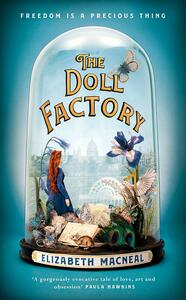Take a photo of a barcode or cover
medium-paced
Plot or Character Driven:
Character
Strong character development:
Complicated
Loveable characters:
Complicated
Diverse cast of characters:
No
Flaws of characters a main focus:
Yes
dark
emotional
sad
tense
medium-paced
There is so much I want to say. There was so much of this book that I loved, so much that tickled my fancy and made my Pre-Raphaelite-loving heart happy. Yet for every beautiful, romantic moment there are at least two other moments that made me cringe, that filled my heart with dread or even outright terror.
The Doll Factory is a story of art, but not really. It is a story of romance, of beauty, of everyday life, but it also critiques the ways in which art warps reality and the ways that we warp reality ourselves. It is a story about women being trapped in a society that treats them like dolls to be played with, abused, and thrown away when their caretakers grow bored of them. Above all, it is a story that beautifully demonstrates a traditional tenet of storytelling: the raveling and unraveling of tension.
The Doll Factory is a masterclass in the building of tension.
Iris's upward trajectory from overworked dollmaker's apprentice to Pre-Raphaelite model and talented artist in her own right is mirrored by Silas's trajectory from eccentric but harmless taxidermist to deeply depraved erotomania. The first two parts of the novel move along at a slow though not unpleasant pace, but the latter half of the second part and the entirety of the third part really pick up. The novel truly shines as a cohesive unit. Insignificant moments from the early chapters such as the cracking of a flea under our heroine's fingernail are called back on later to devastating effect. It's a novel I'd love to read many more times to track the movement of symbols, words, motifs.
I'll finish with this.
I love the Pre-Raphaelites. I love Millais's Ophelia. I also hate the Pre-Raphaelites. I hate the way that Dante Gabriel Rossetti picked up Lizzie Siddal and made her his muse but never seemed to appreciate her beyond her likeness that lent itself to many of his paintings and drawings and poems. He taught her to paint, but her true creative potential was lost when she died at 32 from a laudanum overdose. Iris embodies a revisionist history of sorts, a vision of a Siddal-esque Pre-Raphaelite artist who lives to break free of her confines (both literal and metaphorical) and outshine those who saw her as a doll first and artist second.
The Doll Factory is a story of art, but not really. It is a story of romance, of beauty, of everyday life, but it also critiques the ways in which art warps reality and the ways that we warp reality ourselves. It is a story about women being trapped in a society that treats them like dolls to be played with, abused, and thrown away when their caretakers grow bored of them. Above all, it is a story that beautifully demonstrates a traditional tenet of storytelling: the raveling and unraveling of tension.
The Doll Factory is a masterclass in the building of tension.
Iris's upward trajectory from overworked dollmaker's apprentice to Pre-Raphaelite model and talented artist in her own right is mirrored by Silas's trajectory from eccentric but harmless taxidermist to deeply depraved erotomania. The first two parts of the novel move along at a slow though not unpleasant pace, but the latter half of the second part and the entirety of the third part really pick up. The novel truly shines as a cohesive unit. Insignificant moments from the early chapters such as the cracking of a flea under our heroine's fingernail are called back on later to devastating effect. It's a novel I'd love to read many more times to track the movement of symbols, words, motifs.
I'll finish with this.
I love the Pre-Raphaelites. I love Millais's Ophelia. I also hate the Pre-Raphaelites. I hate the way that Dante Gabriel Rossetti picked up Lizzie Siddal and made her his muse but never seemed to appreciate her beyond her likeness that lent itself to many of his paintings and drawings and poems. He taught her to paint, but her true creative potential was lost when she died at 32 from a laudanum overdose. Iris embodies a revisionist history of sorts, a vision of a Siddal-esque Pre-Raphaelite artist who lives to break free of her confines (both literal and metaphorical) and outshine those who saw her as a doll first and artist second.
I enjoyed how Elizabeth Macneal explored the different character's motivations and imbued each page with a simultaneous sense of wonderous optimism and despairing revulsion. I really felt drawn into the character's world. Despite the Victorian setting, the main character Iris was relatable, quite modern in her desire to follow her own path and explore the world of colour and art. She somehow remained ladylike but spirited. Usually in Victorian type novels the heroine is either completely rebellious and wild or prim and proper. Iris seemed to be "normal" in that you could easily picture her walking down the streets of London and not obviously pick her out as a fictional character.
This was a gripping tale from the start to finish. The use of metaphor was sublime. I look forward to perusing Elizabeth Macneal's future works.
This was a gripping tale from the start to finish. The use of metaphor was sublime. I look forward to perusing Elizabeth Macneal's future works.
Esperava outro tipo de desenvolvimento do livro. O que se considera mistério não é mais do que um ocultar de informações que, no fundo, não chegam a ser explicadas ou desenvolvidas, e nem têm o impacto que é promovido ao longo da leitura. O desenvolvimento central passa da personagem introdutória para as secundárias, e trata-se apenas de frisar um romance entre elas. Li sempre com a ânsia de chegar ao ponto onde o trágico acontece... mas o trágico demora a chegar e, depois, é tão mal descrito e aproveitado que não transmite as emoções necessárias para sentir o "terror" do acontecimento. Talvez por também ter visualizado há pouco tempo a série "You", isto pareceu-me um final abrupto muito cópia da série. Além disso, muitos dos acontecimentos são descritos como se em segundos fosse possível acontecer tudo, extremamente rápidos.
I really enjoyed this book. It had a dark edge to it in the form of obsessive love and the lengths someone will go to when obsession takes hold.
The characters are well formed and the setting and atmosphere are captured well. I felt there was a slight lull in the middle of the book but once it picked up again, it galloped away and I found it hard to put down wanting to reach the end and hopefully a satisfying conclusion. I did find it ended a little abruptly for my liking. It was almost like the publisher said you have to submit it tomorrow and so the ending was rushed. I wanted a little more but perhaps that was just me. The ending felt a little lightweight and although my questions were answered fully, I felt as if I wanted a more explanation to how the endpoint was reached. Perhaps this was simply because I liked reading about the characters and their lives and I didn't want it to end.
It's a great debut novel and Elizabeth Macneal should be proud of her accomplishment. I'd happily read more work by this author.
The characters are well formed and the setting and atmosphere are captured well. I felt there was a slight lull in the middle of the book but once it picked up again, it galloped away and I found it hard to put down wanting to reach the end and hopefully a satisfying conclusion. I did find it ended a little abruptly for my liking. It was almost like the publisher said you have to submit it tomorrow and so the ending was rushed. I wanted a little more but perhaps that was just me. The ending felt a little lightweight and although my questions were answered fully, I felt as if I wanted a more explanation to how the endpoint was reached. Perhaps this was simply because I liked reading about the characters and their lives and I didn't want it to end.
It's a great debut novel and Elizabeth Macneal should be proud of her accomplishment. I'd happily read more work by this author.
adventurous
challenging
dark
emotional
mysterious
tense
Wow, this book was truly beautiful yet very horrifying. It wasn’t what I expected as I thought this was a historical fiction focused on Pre-Raphaelite art (art that I’ve been obsessed with for years), which is definitely was, but that horror, obsession, and cruelty of Silas really led the book in a direction that made me feel as though I was reading a Victorian version of ‘The Silence of the Lambs’. The detailed cruelty of animals and people in this book disturbed me, but the good was more overpowering.
The good: Art!! Gothic and beautiful story telling that portrayed that griminess of Victorian London. Iris herself was a character I enjoyed so much and I loved reading about her journey into becoming a Pre-Raphaelite model! The story overall was hauntingly beautiful and I truly enjoyed it. 4.5 stars! ✨
The good: Art!! Gothic and beautiful story telling that portrayed that griminess of Victorian London. Iris herself was a character I enjoyed so much and I loved reading about her journey into becoming a Pre-Raphaelite model! The story overall was hauntingly beautiful and I truly enjoyed it. 4.5 stars! ✨
I heard about this book on the podcast Tea and Tattle by Miranda Mills. Miranda always has great recommendations and I really loved hearing from the author before I read the book. I was definitely pulled in by the premise: a young woman who an aspiring pre-raphaelite painter. Anyone who has seen a painting from the Pre-Raphaelite Brother knows how dreamy the worlds they create on the canvas are. I’ve always wanted to immerse myself into their world, so with the protagonist of this novel being a model for an artist, it seemed a perfect way to do so.
This novel is sumptuous with Victorian delight. I loved the details of London in this era- from the Crystal Palace, to walks in the Royal Parks, boating excursions along the Thames, and the cobblestone streets filled with adventure. The author did a great job of bringing to life this world and the various details in it. I really enjoyed the Pre-Raphelite painters as characters, as well as Iris and her sister Rose. Albie, the “street urchin” character, was a delight.
I was really surprised by Silas. I hadn’t really understood going into this book that it was more of a dark, even horror novel. When I first started reading, he reminded me of Mr. Hancock from The Mermaid and Mrs. Hancock by Imogen Hermes Gower and I thought he would be a charming character. I WAS SO WRONG. Silas is basically a Victorian incel. This book takes a lot of terrifying turns and I was definitely distrubed by Silas in every way.
I would rate this book a 3.5 out of 5, but I’m rounding down to a three because The book takes a bit to get into, but once I was about 60 pages in, I couldn’t put it down! I do love historical fiction especially in this time period with art infused- I just had some issues with the ending.
This novel is sumptuous with Victorian delight. I loved the details of London in this era- from the Crystal Palace, to walks in the Royal Parks, boating excursions along the Thames, and the cobblestone streets filled with adventure. The author did a great job of bringing to life this world and the various details in it. I really enjoyed the Pre-Raphelite painters as characters, as well as Iris and her sister Rose. Albie, the “street urchin” character, was a delight.
I was really surprised by Silas. I hadn’t really understood going into this book that it was more of a dark, even horror novel. When I first started reading, he reminded me of Mr. Hancock from The Mermaid and Mrs. Hancock by Imogen Hermes Gower and I thought he would be a charming character. I WAS SO WRONG. Silas is basically a Victorian incel. This book takes a lot of terrifying turns and I was definitely distrubed by Silas in every way.
I would rate this book a 3.5 out of 5, but I’m rounding down to a three because
Spoiler
Iris has to go through SO MUCH horror and torture and stuff. She finally escapes and frees herself and I love that message, but there is not real closure to any of the plots with her sister and Louis. I would have really liked to see her unite with loved ones and get justice on Silas, instead of her just running out into the street. It seemed really cruel to put the readers through reading ⅓ of the novel of her torture with such minimal details of closure at the end.
I couldn’t put it down and those end few weeks I pages are the stuff of nightmares.







